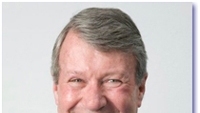Broadcasters launch future forum

The world’s leading broadcasters are being given a forum to debate and respond to the upheavals shaking their industry. The new Global Broadcast Summit (GBS) has been set up to hold a two-day meeting in London in November 2012.
The summit will be attended exclusively by around 80 CEOs from major broadcasters and chaired by Michael McEwen, who is also director general of the North American Broadcasting Association (NABA).
As part of the process and to provide fuel for the debate, the GBS will conduct a worldwide CEO survey in the run up to the summit, to discover how broadcasters have responded so far to the dramatic changes seizing their industry. The summit will then identify core areas of agreement and form an advisory group that will lobby governments and attempt to influence public broadcasting policy around the world, according to McEwen.
“We believe there is still a future for freely accessible over the air services,” said McEwen last week at a briefing in London to announce the GBS. “But we need a new definition of what the objectives are.”
McEwen identified three areas that broadcasters should focus on in formulating new policy objectives. First, the emergence of online services and multiscreen content consumption is changing the relationship with the end consumer and creating new business models that broadcasters need to embrace. Second, the expansion of existing pay and speciality channels on cable, satellite and IPTV is disrupting the traditional stable and placid licensing structure, which, therefore, that needs revising and updating to create a level playing field. Third, the proliferation of social media has brought new pressures and influences to bear on TV journalism, extending the range of sources and outlets and increasing the scale of real time reporting. The combined effect of these forces is to create demand for content anytime, anyplace, and anywhere, with broadcasters in grave danger of being left behind and becoming irrelevant.
“What worries me is I see an industry that is hanging on in there,” said McEwen.
Some broadcasters were still strong, such as the BBC in the UK with its privileged position of being funded almost entirely by license fee income, without the dependence on commercial advertising faced by most other Free To Air broadcasters.
The professional video industry's #1 source for news, trends and product and tech information. Sign up below.
“Elsewhere there are broadcasters in trouble, even in the US,” said McEwen.
Broadcasters needed to come out of denial and face the emergence of big online distribution channels, particularly Apple and Google.
“They don’t want to talk to Google and Apple,” said McEwen. “When those folks are there, they suck the air out of the room. But, as far as I’m concerned, Apple is a hardware company and Google is in the ether. I think there is a need for a forum where they can all sit down, and engage the Googles and Apples as well as Microsoft.”
The GBS has been set up as a commercial venture, but without any mandate to return a profit.
“We don’t think we are going to be profitable, and will be struggling to break even,” said McEwen.
Funding will come from a small number of prominent sponsors, with Sony and Harris, along with two others yet to be named, already on board. But, its success will really depend on the response from the CEOs who have been invited from around 120 broadcasters. McEwen is hoping for a minimum of about 60 and preferably 80 to 90, and has already been given support from some, such as the BBC’s director general Mark Thompson, and Jean-Paul Philippot, President of the European Broadcasting Union (EBU).
The GBS will invite senior representatives of leading regulators, such as Julius Genachowski, chairman of the FCC, to address the inaugural summit, or perhaps future events. The London summit will be held in closed sessions to allow the CEOs to express views they might not like to see reported, but the longer term aim is to establish a broader forum to which analysts and journalists will be invited to contribute.
